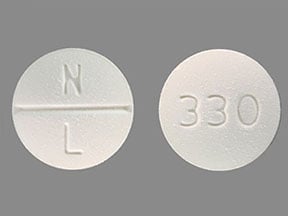
Trimethoprim Coupons & Savings Card – Discount Prices from $36.00
Trimethoprim is an antibiotic primarily used to treat urinary tract infections (UTIs). It functions by inhibiting the growth of bacteria, effectively stopping them from producing folic acid, which is essential for their survival. It is important to note that Trimethoprim specifically targets bacterial infections and is ineffective against viral infections, such as the common cold or flu. Misuse or overuse of antibiotics can lead to reduced effectiveness in future treatments. Trimethoprim is generally taken orally in tablet form, either once or twice a day. Some common side effects include skin rash and itching. Always consult with your healthcare provider before starting any new medication to ensure it is appropriate for your condition.
Our coupons are free to use. Before paying, show the pharmacist your Trimethoprim savings card to get your free discount. Use our filters below to edit the prescription box to match your needs. The Trimethoprim prices will update based on your prescription needs. Above our Trimethoprim coupons, you can change your location to see pharmacy prices and costs in other areas. We're here to help you buy Trimethoprim at the lowest price with our prescription discount card.
My prescription
Edit
100MG, Trimethoprim (90 Tablets)
Select pharmacy

CVS
$36.00
COUPON PRICE
Walgreens
$58.86
COUPON PRICE
Albertsons
$73.77
COUPON PRICE
Walmart
$156.42
COUPON PRICETrimethoprim savings card
Show this card to your pharmacist
CVS
$36.00
BIN
ID
PCN
GRP
019876
LHC6CE7201
CHIPPO
LHX
Powered by
Trimethoprim is an antibiotic primarily used to treat urinary tract infections (UTIs). It functions by inhibiting the growth of bacteria, effectively stopping them from producing folic acid, which is essential for their survival. It is important to note that Trimethoprim specifically targets bacterial infections and is ineffective against viral infections, such as the common cold or flu. Misuse or overuse of antibiotics can lead to reduced effectiveness in future treatments. Trimethoprim is generally taken orally in tablet form, either once or twice a day. Some common side effects include skin rash and itching. Always consult with your healthcare provider before starting any new medication to ensure it is appropriate for your condition.
Our coupons are free to use. Before paying, show the pharmacist your Trimethoprim savings card to get your free discount. Use our filters below to edit the prescription box to match your needs. The Trimethoprim prices will update based on your prescription needs. Above our Trimethoprim coupons, you can change your location to see pharmacy prices and costs in other areas. We're here to help you buy Trimethoprim at the lowest price with our prescription discount card.
More prescriptions for urinary tract infection
coupons from$27.72Save 86%
coupons from$4.79Save 95%
coupons from$120.90Save 78%
coupons from$37.93Save 84%
coupons from$37.03Save 62%
coupons from$77.70Save 93%
coupons from$4.93Save 82%
coupons from$262.20Save 64%
More prescriptions for urinary tract infection
Methenamine Mandelate Save 86%coupons from $27.72
Ciprofloxacin Hcl Save 95%coupons from $4.79
Minocycline ER Save 78%coupons from $120.90
Cefadroxil Save 84%coupons from $37.93
Monurol Save 62%coupons from $37.03
Solodyn Save 93%coupons from $77.70
Erythromycin Save 82%coupons from $4.93
Invanz Save 64%coupons from $262.20
Trimethoprim dosage forms
Use our Trimethoprim 100MG coupon with prices from $36.00 for 90 Tablets. You can also use our Trimethoprim 100MG coupon with prices from $20.46 for 20 Tablets. We have a Trimethoprim 100MG coupon with prices from $37.08 for 100 Tablets.
Dosage Quantity Price from Per unit 100MG 90 Tablets $36.00 $0.40 100MG 20 Tablets $20.46 $1.02 100MG 100 Tablets $37.08 $0.37
| Dosage | Quantity | Price from | Per unit |
|---|---|---|---|
| 100MG | 90 Tablets | $36.00 | $0.40 |
| 100MG | 20 Tablets | $20.46 | $1.02 |
| 100MG | 100 Tablets | $37.08 | $0.37 |
